Herstal
Herstal, formerly known as Heristal, or Héristal, is a municipality in Liège Province, Belgium. It lies along the Meuse river, in the country's Wallonia region. Herstal is included in the "Greater Liège" agglomeration, which counts about 600,000 inhabitants.
Herstal | |
|---|---|
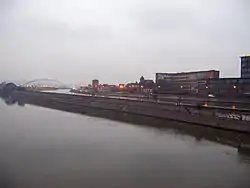 | |
 Flag Coat of arms | |
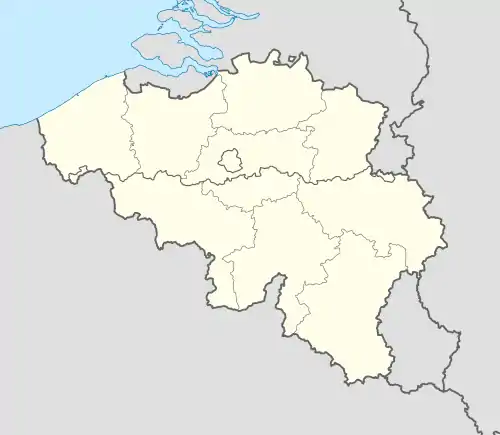 Herstal Location in Belgium
Location of Herstal in Liège province 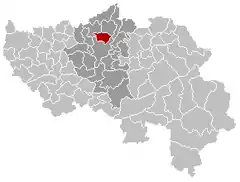 | |
| Coordinates: 50°40′N 05°38′E | |
| Country | Belgium |
| Community | French Community |
| Region | Wallonia |
| Province | Liège |
| Arrondissement | Liège |
| Government | |
| • Mayor | Frédéric Daerden (PS) |
| • Governing party/ies | PS, E.P.H. |
| Area | |
| • Total | 23.54 km2 (9.09 sq mi) |
| Population (2018-01-01)[1] | |
| • Total | 39,958 |
| • Density | 1,700/km2 (4,400/sq mi) |
| Postal codes | 4040-4042 |
| Area codes | 04 |
| Website | www.herstal.be |
Herstal municipality includes the former communes of Milmort, Vottem, and a portion of Liers (the other part being incorporated into Juprelle). A large armaments factory, the Fabrique Nationale or FN, and the biggest industrial zone of Wallonia (Haut-Sart) provide employment locally.
History
Merovingian and Carolingian golden age
The proximity of the Meuse River and the abundance of local resources attracted settlers in this area since the fifth millennium BC. Around the end of the Roman era and at the beginning of the Merovingian period, the hamlet had become a fortified stronghold. The major road that linked Tongeren to Aachen crossed the Meuse here, where a ferry likely carried travelers to Jupille.
The name Herstal is of Franconian origin, consisting of the elements hari ("army") and stal ("resting place", compare "stable"). The first mention of Herstal is in Latin documents from ±718 (Cheristalius corrected to Charistalius) and 723 (Harastallius). The first possibly non-Latinized occurrences are Eristail (in 919) and Harstail (1197).[2]
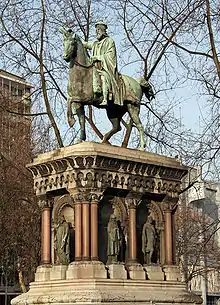
Pippin of Herstal (ca 635–714), Mayor of the Palace and de facto ruler of Austrasia and Neustria and founder of the family that established the Carolingian dynasty, probably chose this location as his main residence because of its proximity to the major cities of Tongeren, Maastricht, and Liège. Pippin was the father of Charles Martel, victor of the decisive Battle of Tours that stopped the Arab-Muslim advance into northwestern Europe, and great grandfather of Charlemagne, also supposedly born in Herstal. Charlemagne lived for at least fifteen years in Herstal but later established his capital in Aachen, ending Herstal's period of medieval glory as capital of the empire.
Late Middle Ages until now
The town was incorporated into the Duchy of Lower Lotharingia, which became part of the Duchy of Brabant at the end of the 12th century. Despite its proximity to Liège, the territory of Herstal did not become part of the Prince-Bishopric of Liège until 1740, when the prince-bishop Georges-Louis de Berghes bought it from Frederick II of Prussia.[3] By that time, the town was mainly known for its able craftsmen: ceramists, blacksmiths, and clockmakers.
In the 19th century, Herstal became a city of coal and steel. It would, however, become world-famous thanks to the foundation of the Fabrique Nationale, a major armament factory, in 1889. Several motorcycle manufacturers also established themselves in town. On August 7, 1914, at the very beginning of World War I, the invading German army executed 27 civilians and destroyed 10 homes in Herstal.
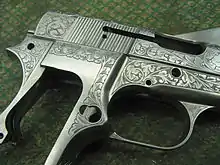
After World War II, heavy industry saw a prolonged period of decline, drastically reducing the number of jobs in these areas. Today, Herstal's economy is picking up again, with more than 200 companies established on its territory, including Techspace, which manufactures precision parts for the European Space Agency’s Ariane rocket.
Politics
| Municipal head | |
|---|---|
| Mayor | Frédéric Daerden (PS) |
| Deputies | Franco Ianeri (PS) Marc Haeken (PS) Jean-Louis Lefebvre (PS) Christian Laverdeur (PS) Léon Campstein (PS) André Namotte (E.P.H.) Isabelle Thomsin (PS) |
| Party | % | Diff. 2000 | Seat | Diff 2000 | Leader |
|---|---|---|---|---|---|
| PS[4] | 50,86 | -1,14 | 20 | -1 | Albert Crépin |
| EPH (PSC) | 18,99 | +2,59 | 6 | +1 | Norbert Weytjens |
| MR[5] (PRL) | 14,14 | +3,24 | 4 | +1 | Jennifer Maus [6] |
| PTB[7] | 9,38 | +2,18 | 2 | 0 | Nadia Moscufo |
| ECOLO[8] | 6,62 | -2,28 | 1 | -1 | Anne-Marie Meunier-Balthasart |
Herstal is a left-wing/socialist stronghold. It was also the strongest area in support of the far-left Workers' Party of Belgium in the 2019 elections, gaining 27.55% of the votes in Herstal.[9]
Sights
- A museum, housed in a 1664 building typical of the region, shows various artifacts of the Prehistoric and Gallo-Roman periods, a Frankish burial place, and several displays retracing the history of the Pippinid dynasty that originated here. The museum also has a collection of local industrial products, including samples from the FN.
- The Pippin Tower incorporates a wall section thought to have belonged to the palace of Charlemagne.
Notable people
- Pippin of Herstal, Mayor of the Palace of Austrasia, Neustria and Burgundy (635 or 640–714)
- Charles Martel, Mayor of the Palace and Duke of the Franks (686–741)
- Charlemagne, king of the Franks and founder of the Holy Roman Empire (742 or 747–814, birth in Herstal is uncertain)
- John Browning, American firearms designer (1855–1926)
Twin cities
References
- "Wettelijke Bevolking per gemeente op 1 januari 2018". Statbel. Retrieved 9 March 2019.
- Maurits Gysseling, Herstal in the Toponymical Dictionary of Belgium, the Netherlands, Luxembourg, Northern France and West Germany (before 1226).
- Histoire de la principauté de Liège, B. Dumoulin, J.L. Kupper, éd. priv., 2002, (ISBN 2708947753)
- OVH. "Félicitations ! Votre domaine a bien été créé chez OVH !".
- MR : Section de HERSTAL Archived 2012-06-05 at Archive.today
- "Jennifer Maus". Archived from the original on 2010-10-27. Retrieved 2009-03-18.
- liege.ptb.be: Actuel
- "ECOLO - Ecolo - Groupe local de Liège".
- https://www.ptb.be/resultats2019

